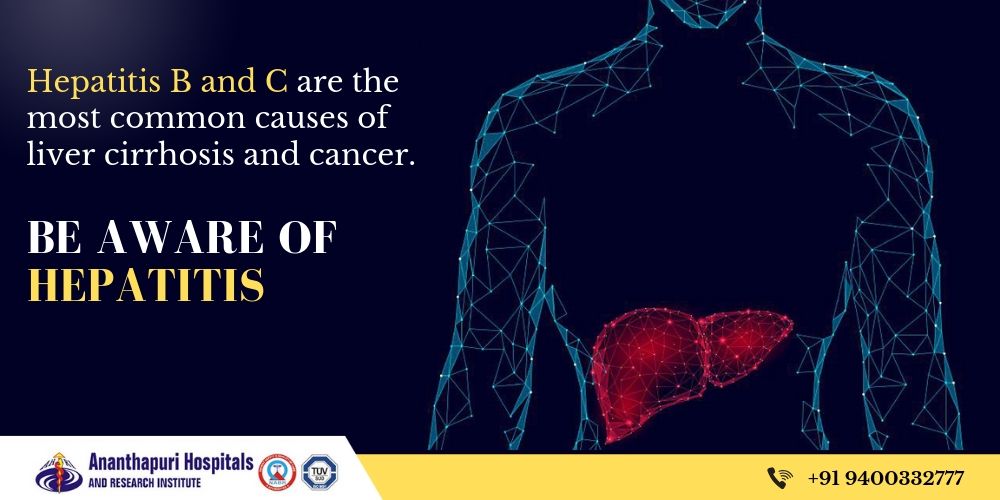- 26/July/2019

Hepatitis - Symptoms, Prevention & Treatment - Ananthapuri Hospitals
Did you know that if you have infectious forms of hepatitis that are chronic, like hepatitis B and C, you may not have symptoms in the beginning? The only way to prevent hepatitis is by being aware of its causes and taking suitable precautions.
Here are a few things you need to know about hepatitis:
- What is hepatitis?
Hepatitis is an inflammation of the liver. It is most commonly caused by hepatitis viruses but it can also be caused by other infections, toxic substances (alcohol, drugs) and autoimmune diseases. This condition can be self-limiting or can lead to fibrosis (scarring of the liver), cirrhosis or liver cancer.
- What are the types of hepatitis and how are they transmitted?
There are infectious and non-infectious hepatitis conditions.
- Viral/infectious hepatitis: There are five types of viral hepatitis, namely Hepatitis A, B, C, D, and E, caused by the hepatitis viruses A, B, C, D and E respectively. Hepatitis A and E are transmitted through contaminated food and water. Hepatitis B, C and D are transmitted through infected body fluids like blood. Hepatitis A is an acute, short-term disease and Hepatitis B, C and D are most likely to become ongoing and chronic. Hepatitis B and C are the most common cause of liver cirrhosis and cancer. Hepatitis E is acute but can be dangerous for pregnant women.
- Non-infectious hepatitis: Hepatitis can also develop through excessive alcohol consumption and exposure to other toxins. In some cases, the defects in the immune system can cause inflammation that can affect liver function.
- What are the symptoms?
Signs and symptoms of acute hepatitis (A and E) include:
- Fatigue
- Fever
- Flu-like symptoms
- Abdominal pain
- Signs of jaundice (yellow skin and eyes)
- Dark urine and pale stool
- Loss of appetite
- Unexplained weight loss
On the other hand, if the hepatitis is chronic (Hepatitis B, C and D), it rarely exhibits any symptoms in the beginning. It may not occur until the damage affects the functioning of your liver!
- How is hepatitis prevented?
Practising good hygiene and taking vaccinations are important steps to prevent hepatitis.
- Hepatitis A: It can be prevented by taking the hepatitis A vaccine. You will need 2 doses for long-lasting protection. The vaccine is recommended for children 12 to 23 months old, followed by a second dose 6 to 18 months later. Hepatitis A vaccine is also available for adults and can be combined with the hepatitis B vaccine.
- Hepatitis B: It can be prevented with vaccination. Three doses of vaccinations are completed over the first six months of childhood. This vaccine is also available for adults.
- Hepatitis D: It can be prevented by getting the vaccination for hepatitis B, as infection with hepatitis B is necessary for hepatitis D to develop.
- Hepatitis C and E: There are no commercially available preventive vaccines for hepatitis C and E at present.
- How is hepatitis treated?
Treatment depends on whether the infection is acute or chronic.
- Hepatitis A: It does not usually need treatment as it is a short-term illness. You will be managed symptomatically. Your doctor may recommend you to take bed rest in case the symptoms cause discomfort.
- Hepatitis B: hepatitis B is treated with antiviral medications that are continued for several months or years.
- Hepatitis C: Acute and chronic forms of hepatitis C are treated using antiviral medications. Your doctor may do further assessments to determine the best form of treatment. If chronic hepatitis C progresses to cirrhosis or liver disease, you may have to undergo a liver transplant.
- Hepatitis D: There is no specific treatment for hepatitis D infection at present. Antivirals used to treat hepatitis B have little effect on hepatitis D. You may be required to follow up with a liver specialist on a long-term basis.
- Hepatitis E: There are no specific treatments available to treat hepatitis E because the infection is often acute and resolves on its own. Your doctor may advise you to get adequate rest, drink plenty of fluids, get enough nutrients, and avoid alcohol. Pregnant women who have hepatitis E need close monitoring and care.
- Someone close to me has hepatitis. How can I prepare myself to prevent exposure to this disease?
- Consult a doctor and get vaccinated. Also, make sure that your closed one is vaccinated.
- Wash your hands frequently and keep it sanitised.
- Drink only clean and boiled water.
- Hepatitis B or C can be spread through contaminated blood or tissue fluid. Blood spills, dry or not, should be cleaned and disinfected with a mixture of bleach and water in a 1:10 ratio.
- Always use gloves while cleaning up any blood spills. Even dried blood can be infectious.

